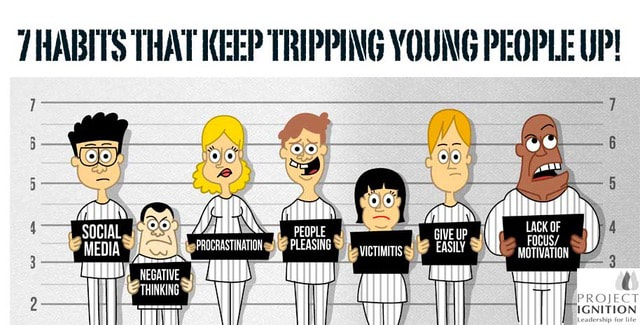|
It is strange to imagine that teenagers and young adults have already developed some of the habits that contribute to dysfunction in their lives. Yet in our work with young people and their reflections on the habits that prevent them from being their greatest, these were the 7 that came up tops  1. Preoccupation with social media For young people, social media is like a drug. It gets them hooked, then it consumes them, gives them reason to return to it and eventually makes them dysfunctional as they struggle to meet deadlines or even have imagined "insomnia" caused by the desire to chat and follow friends in the world of social media. Although technology is praised for enhancing our capacity and speed to share information across the length and breadth of this world, the other side of it is that it takes the pressure off young people to interact with people in real life situations, it distracts them and also contributes to a restlessness that result in what we observe today, young people glued to their smartphones. 2. Procrastination Procrastination is a common problem many people face. Nowadays, it seems that people have become dependent on stress to get themselves motivated, feel challenged and get things done. Procrastination can quickly become a habit if left unchecked, and that habit is a huge source of lifestyle stress. Sometimes teens procrastinate for reasons that are not obvious. Procrastination does not always equal laziness or irresponsibility. Be sure to consider whether your teen is facing another problem that is creating procrastination. Such problems could include: (i) not understanding what they are meant to do, (ii) needing extra help to complete the task(s), (iii) they are perfectionists and feel they cannot do a good job, or (iv) they feel anxious. It is important to help the young person figure out what the cause procrastination is and to help them develop strategies to overcome it. 3. Inability to focus and motivate themselves Teenagers may lack the motivation a parent wants - to try harder, to achieve better, to be a self-starter, to care about doing well, to be more ambitious - but they definitely have the motivation to do what they want (like pleasure) and to avoid what they don't want (like work.) So key to get teenagers to want to do better for themselves is through intrinsic motivation. INTRINSIC MOTIVATION = SELF-INTEREST + OWNERSHIP. "I want to take charge of what matters to me and be the one who decides to get it done. I want to do it for my sake, not for anyone else." Thus awakening in them the desire for the outcome. 4. Thinking negative thoughts Negative thinking and also low self-esteem is a thinking disorder in which an individual views him/herself as inadequate, unlovable, and/or incompetent. Once formed, this negative view permeates every thought, producing faulty assumptions and ongoing self-defeating behavior. Negative thinking does not discriminate. It affects all people without regard to their age, sex, color, religion or nationality. Negativity affects a person’s health, their relationships with family and friends, their job or school performance, and a person’s outlook for their future. All teenagers must deal with negative peer pressure. At times we all have negative feelings. To shift from the negative to the positive, we can help them focus on their strengths, change their focus, and teach them the power of affirmation/ 5. Pleasing others (friends and family) Adolescence is probably the time all of us started struggling with balancing our need for belonging, fear of rejection and standing firm in what we knew was right for us. Teens still struggle with peer pressure or of trying to please others and responding to their every desire. For example, when friends show up unexpectedly, even though the teen may know they have to study, they may not have the heart to tell the friends that they cannot hang out. Or when a parent really wants the young person to do something (like swimming even though the young person prefers music) they do so just to please the parent. The problem with pleasing others is that even in attempting to please others, the young person is neither pleasing others nor themselves. 6. Victimitis This is the habit of blaming all problems on parents, teachers, your neighbourhood, friends or somebody else. Where circumstances seem to be the scapegoat for adopting a victim approach. Where the young person does not take responsibility for their life. Where they believe they have no agency and power to do anything, so they do nothing and continue the pattern of victimhood. 7. Giving up easily Strangely enough, 90% of the youth we work with when surveyed at the beginning of our programme indicated that they give up after their first attempt at something failed. What this means in reality is that they stop setting goals, and settle for the status quo. This habit thus gets them to settle into a comfort zone and is similar to victimitis. It is important to understand where young people are so that we can figure out ways to inspire and motivate them to exceed their ability to succeed.
2 Comments
6/27/2024 07:01:45 pm
What are the seven habits that pose challenges for young people and hinder their personal and professional growth? Regard <a href="https://sci.telkomuniversity.ac.id/news/kuliah-umum-from-idea-to-startup-navigating-the-path-to-unicorn/">Telkom University</a>
Reply
Leave a Reply. |
|

